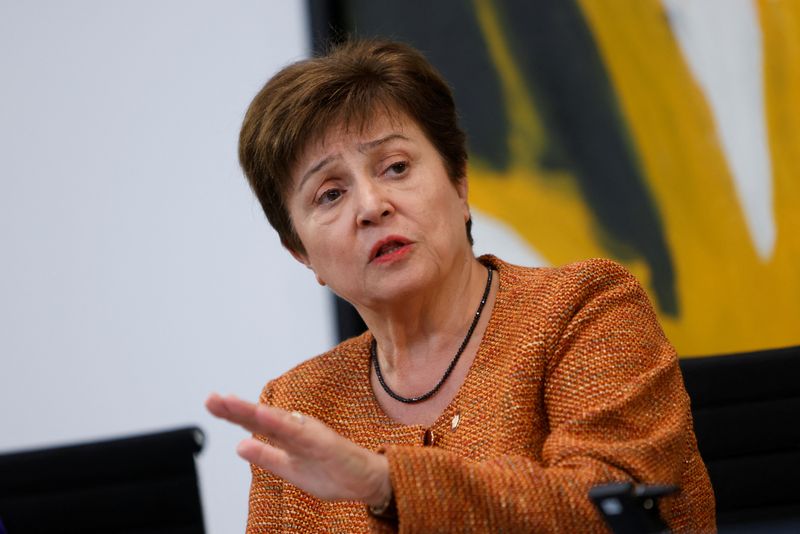By Andrea Shalal
WASHINGTON (Reuters) -The International Monetary Fund expects global economic growth to dip below 3% in 2023 and to remain at around 3% for the next five years, Managing Director Kristalina Georgieva said on Thursday, flagging increased downside risks.
That is the global lender's lowest medium-term growth forecast since 1990, and well below the average growth of 3.8% seen in the past two decades.
Georgieva said strong monetary and fiscal policy actions to respond to the COVID-19 pandemic and Russia's invasion of Ukraine had prevented a much worse outcome in recent years, but growth prospects remained weak given persistently high inflation. Bank failures in Switzerland and the United States had exposed financial vulnerabilities that increased the downside risks for the global economy, she added.
"Despite surprisingly resilient labor markets and strong consumer demand, despite the uplift in China, we expect the world economy to grow less than 3% this year," she said in a speech ahead of next week's spring meetings of the IMF and World Bank. "Growth remains historically weak now and in the medium-term."
"With rising geopolitical tensions, with inflation still running high, a robust recovery remains elusive, and that harms the prospects of everyone, especially for the most vulnerable people and the most vulnerable countries," she said at an event hosted by Meridian House and Politico.
Global growth dropped by almost half to 3.4% in 2022 following the shock of Russia's war in Ukraine from the 6.1% rebound seen in 2021.
Georgieva said India and China would account for half of global growth in 2023, but about 90% of advanced economies would see a decline in their growth rate this year.
Low-income countries, saddled by higher borrowing costs and weakening demand for their exports, would see per-capita income growth staying below that of emerging economies, she said.
The IMF chief called on central banks to stay the course in the fight against inflation as long as financial pressures remained limited, but to address financial stability risks when they emerge through appropriate provision of liquidity.
Recent bank failures in Switzerland and the United States had exposed risk management failures at specific banks and supervisory lapses, she said.
"The key is to carefully monitor risks in banks and non-bank financial institutions, as well as weaknesses in sectors such as commercial real estate," she added. "Now is not the time for complacency."
"Clearly downside risks have increased. We now see some of the risks in the financial sector more exposed," she said, adding that she had "full confidence" that central banks and other relevant institutions were very vigilant of the dangers.
While policymakers had responded swiftly to recent stress in the sector, concerns remained about potential "hidden" vulnerabilities at banks and non-banks, she said.

To boost the prospects for growth and productivity, Georgieva called for major step changes, including an estimated $1 trillion a year in spending on renewable energy, and moves to avoid the fragmentation of the global economy, which could shave as much as 7% off global gross domestic product.
Technological decoupling could see some countries suffer losses of up to 12% of GDP, she said.